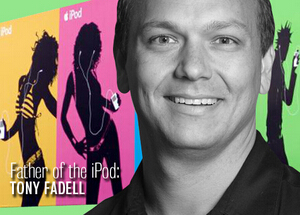(单词翻译:单击)

Tony Fadell, a former Apple AAPL -1.03% executive who went on to co-found Nest (which recently sold to Google GOOG 0.26% for $3.2 billion), has been likened to Steve Jobs and Larry Page for his innovative thinking and disruptive technology.
托尼·法德尔曾经是苹果公司(Apple)高管,离职后与人共同创建了Nest【这家公司最近被谷歌(Google)斥资32亿美元收购】。他因为创造性的思维和颠覆性的技术被人们比作史蒂夫o乔布斯以及拉里·佩奇。
Following our recent feature story about him in the June 30, 2014 issue of Fortune magazine—as wellhis recent appearance at the Fortune Brainstorm Green conference in Laguna Nigel, Calif.—here are some of his thoughts that didn’t make the magazine story.
2014年6月30日出版的《财富》杂志将刊登一篇关于法德尔的特写。此外,他最近还出席了在加州拉古纳尼古尔召开的《财富》绿色头脑风暴大会(Brainstorm Green Conference)。下面是杂志当期报道中未能收录的一些法德尔的想法。
Fortune: Tell me your ‘Aha! moment’ in starting Nest, with its first product being a thermostat.
《财富》:你创建了Nest,开发了公司的第一款产品——恒温器。说说你当时灵光一现的顿悟时刻吧。
Fadell: Well, first, I asked, was there a good product idea? And I thought, “Yeah, there’s a good product idea. Okay, there’s none out there. I can research everything on the web. There’s just nothing there.” So then I said, “Okay. Is it a good business? I know I can make this thing. Is it a good business?” And then I asked, “How many are being sold a year? What’s the total available market?”
法德尔:首先,我问自己,这个产品构思好不好?我的回答是:“这个产品构思很好,市场上还没有类似产品。我在网上什么都能查。但市场上就是没有类似产品。然后我问:“那这项业务是否具备商业价值?我知道我能开发出产品,但这是桩好生意吗?我接着问:“这款产品每年的销量有多大?整个市场有多大?”
And when I started doing the research, I was like, “Wait a second. There’s a quarter of a million thermostats in the U.S. alone? Well, if there’s that, what’s the replacement rate?” And I looked and it was over 10 million a year for just residential and light commercial thermostats. I was like, “Wait a second. 10 million? That’s more than game machines! That’s more than washers, dryers, stoves, and ovens. That’s a big market.” We’re dying to find big markets, right? So what else is out there? Bicycles are about the same. Now, people might not perceive it as such. It was just like when we were doing the iPod, people were like, “There’s no money in CD players. It’s commoditized. There’s nothing there. Move on!” The number of units is stagnant, and the price drops every year. That’s the kind of market that’s usually ripe for innovation.
我研究发现,“哇,光美国就有25万个恒温器?那它的更新率如何?”我发现,光住宅和轻型商用恒温器每年就要更换1000多万只。我当时想道:“天呐,1000万个?这比游戏机要多!比洗衣机、干衣机、炉灶和烤箱都要多。这是个大市场。”我们渴望找到大市场,对吧?那么还有哪些是大市场?自行车市场的规模与之相当。只不过人们可能不觉得这是个大市场。就好比我们当年做iPod时,很多人都说:“CD播放器市场没钱赚。已经实现商品化了。没戏了。去干别的吧!”产品销量停滞,产品价格连年下降。这种市场往往到了该创新的时候。
So you had an idea you liked. Then what?
于是你有了一个自己喜欢的想法。然后呢?
Then I looked at the competition, and I said, “Let’s look who can do what it takes to make this next-generation thermostat.” I went down all the current incumbents, and tried to look for startups that were doing it. And every time I looked, I was like, “Wait a second. If there was true innovation here, I would be seeing it.” It didn’t seem like there was any activity. And then I looked further and I learned that about 70% of thermostats were sold through wholesale. So they weren’t being designed for people to use. They were being designed for installers to install and sell as many as they possibly could. It had nothing to do about the consumer. And then I said, “Wait a second. There’s a market with an old way of thinking in terms of how the consumer learns about the product. The competition is old and hasn’t moved. And third, there’s no innovation whatsoever.”
然后我调查了一下竞争对手,我说:“我们来看看谁有实力开发出下一代恒温器。”我研究了所有主要的恒温器厂商,尝试寻找正在开发新型恒温器的初创企业。我想:“假如这个领域真的有创新,我肯定能看到。”但似乎没有任何动静。经过更深入的研究,我发现,大约70%的恒温器都是通过批发销售。因此,它们并不是在面向使用者进行设计。过去恒温器的设计只是为了帮助安装者安装和销售尽可能多的产品。换言之,这一切跟消费者完全没关系。于是我告诉自己:“这个市场思维僵化,消费者难以真正了解产品。竞争对手固步自封,不求进取。而且,这个领域没有任何创新。”
It reminded me of when we were looking at the smartphone business. Sure, there was lots of competition, but they were being designed for the carriers to sell to the users, not what the users wanted. Then on top of that I said, “Is there a services business here?” So first, is the thermostat a good business? Then, can you supply services to the thermostat? And that’s when we get into the energy services. And I was like, “Okay. This totally reminds me of the MP3 player revolution and the smartphone revolution, where it first started with revolutionary hardware and software on the device. Then it quickly branched out to services and applications.”
这使我想起了我们当时考察智能手机业务时的情形。手机市场当时确实有很多竞争产品,但它们的设计宗旨都是帮助运营商向用户销售手机,而没有考虑到用户想要什么。另外,我对自己说:“有没有推出服务业务的潜力?”首先,恒温器是否是一项好业务?其次,你能否为恒温器提供服务?我们就这样进入了能源服务领域。我当时想:“这让我想起了MP3播放器革命和智能手机革命,两者最初都是始于设备上革命性的硬件和软件。随后迅速扩展到服务和应用程序。”
At Apple, you weren’t responsible for marketing, but as CEO of Nest you knew that needed to be in your toolkit, right?
你在苹果的时候并不负责市场推广,但作为Nest公司的首席执行官,你知道自己必须具备市场推广的能力,对吧?
Let’s be clear. There’s product marketing, and then there’s marketing and communications. Product marketing, yeah, I was involved in all of that. Marketing and communications is a different thing, which is taking these clear tenets and the differentiation and all these other pieces and then turning them into marketing and messaging and pushing them out through the various print, digital outlets.
我想明确一点。产品营销同市场营销与沟通是两码事。产品营销我全部参与了。但市场营销与沟通则不同,它在于将明确的原则、差异等等转化成营销和消息,同时将它们通过众多纸媒和数字媒体发布出去。
I would work very closely with product marketing, but again, product marketing didn’t know what could be created. So what I would try to do is be the linchpin between what the consumer wanted and what engineering could build, and always trying to stitch that together, trying to understand what the marketing differentiation would be, understanding what the ease-of-use would be or the consumer delight would be, as well as what could actually get done and done at a certain price point. Typically product marketing specs something and throws it over the wall to engineering. Engineering says, “I can’t.” And they redact it or take things out of it, put it back to product marketing, and product marketing says, “That’s all we could get.” I tried to take the fine line between the two to push marketing, saying, “No, we can do a little bit more here on the marketing side. Let’s get bold.” And to engineering, I’d say, “Let’s get bold. But let’s not get too bold that we’ve added so much risk to the project that it may never ship.”
我会同产品营销部门密切合作,但产品营销并不知道能开发出什么。因此,我尝试当消费者想要的产品和工程师能够开发的产品这两者之间的桥梁,一直在尝试把这两者结合起来,尝试了解在市场营销过程中把什么差异作为卖点,了解怎样的产品会让消费者觉得简单易用,或者说能给他们带来愉悦体的验,以及在一定的价位上,能大规模生产出什么样的产品。通常,产品营销部门提出方案,然后就扔给工程设计人员。工程设计人员说:“这不现实。”于是对方案进行修改或删减,然后返给产品营销部门。产品营销部门只好说:“我们只能做出这个来。”我试图在两者之间找到中间路线。我想让营销部门说:“不,我们营销这边可以多做一点。我们胆子可以再大一点。”而对工程设计人员,我想说:“我们胆子还可以放大一点。但别太过火,别给项目增加太多风险,结果根本搞不成。”


